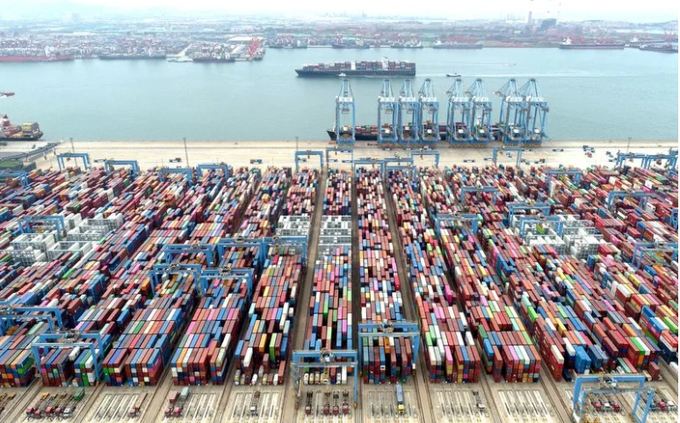November 25, 2025 | 23:52 GMT +7
November 25, 2025 | 23:52 GMT +7
Hotline: 0913.378.918
November 25, 2025 | 23:52 GMT +7
Hotline: 0913.378.918

Containers and cargo vessels at the Qingdao port.
The disappointing trade figures follow other indicators showing patchy growth in November, suggesting Beijing needs to do more to shore up a faltering economy that is only likely to face further challenges next year.
Outbound shipments grew 6.7% last month, customs data showed on Tuesday, missing a forecast 8.5% increase and down from a 12.7% rise in October.
Of more concern for authorities, imports shrank 3.9%, their worst performance in nine months and dashing expectations for a 0.3% increase, keeping alive calls for more policy support to prop up domestic demand.
Top leaders on Monday vowed to ramp up stimulus in 2025, shifting the language around China's monetary and fiscal settings to more accommodative wording in a bid to rev up demand and entice consumers back into spending.
"Global demand is not super strong, data from other major exporters like South Korea and Vietnam point to different levels of slowdown too," said Xu Tianchen, senior economist at the Economist Intelligence Unit.
"Early signs of trade frontloading in anticipation of Trump's tariffs next year have started to emerge, but the full impact will not be felt until the coming months, especially December and January," he added.
U.S. President-elect Trump has pledged to slap an additional 10% tariff on Chinese goods in a bid to force Beijing to do more to stop the trafficking of chemicals used to make fentanyl. He had previously said he would introduce tariffs in excess of 60%.
His threats have rattled China's industrial complex, which sells goods worth more than $400 billion annually to the U.S.
Ahead of expected tariff hikes, exporters rushed to shift stock to U.S. warehouses in October, anticipating shipments for fresh orders once global demand recovers.
While that trend slowed sharply in November, frontloading ahead of expected tariffs may still support exports.
"We expect exports to accelerate again in the coming months, supported by gains in export competitiveness and exporters front-running tariffs," said Zichun Huang, China economist at Capital Economics.
However, unresolved tensions with the European Union over tariffs of up to 45.3% on China-made electric vehicles threaten to open a second front in Beijing's trade war with the West.
China's trade surplus grew to $97.44 billion last month, up from $95.72 billion in October.
U.S. tariffs pose a bigger threat to China than they did during Trump's first term as the $19 trillion-dollar economy's exports are one of its main growth drivers, with household and business confidence dented by a prolonged property crisis.
While manufacturers reported the best business conditions in seven months in a November factory survey, suggesting stimulus is trickling through, they also warned they were receiving fewer export orders.
Those trends have prompted calls by analysts and policy experts for a shift away from an economic over-reliance on manufacturing and exports.
Government advisors have recommended Beijing keeps its growth target unchanged at around 5% next year and implements more forceful stimulus to mitigate the expected U.S. tariffs by leaning on the country's vast domestic consumer market.
China's economic woes prompted policymakers to act in September, with the central bank unveiling its most aggressive monetary easing since the pandemic, cutting interest rates and injecting 1 trillion yuan ($140 billion) into the financial system.
China recorded large falls in imports of commodities such as vegetable oils, rare earths and fertilisers.
Much of that was due to declines in commodity prices although that also helped volumes, which increased for crude oil, coal and copper.
Top policymakers are expected to meet this week to set key targets and policy intentions for next year.
Investors will be watching for remarks that suggest Beijing will prioritise the consumer sector in its policies, having focused this year mostly on upgrading its export-reliant manufacturing sector.
Economists expect China's imports will recover in the coming months, not least because policymakers are expected to expand the fiscal headroom next year.
"Robust fiscal expenditure, much of it likely directed toward investment, should boost demand for industrial commodities in the coming months," Capital Economics' Huang said.
(Reuters)

(VAN) Brazil's COP30 presidency pushed through a compromise climate deal on Saturday that would boost finance for poor nations coping with global warming but that omitted any mention of the fossil fuels driving it.

(VAN) Poultry farmers in the UK have been warned that they could face one of the worst winters yet for bird flu.

(VAN) Prices of main-crop paddy have risen sharply, with jasmine rice hitting 16,100 baht per tonne — the highest level in years.

(VAN) In Brazil, FAO unveiled a series of reports and initiatives showing how sustainable agrifood systems are a solution to the climate crisis.

(VAN) With names like neodymium and dysprosium, rare-earth elements sound exotic — and their perceived scarcity has only added to the mystique.

(VAN) In a new study published in Trends in Biotechnology, researchers used a gene-editing technology called CRISPR to increase a fungus's production efficiency and cut its production-related environmental impact by as much as 61%- all without adding any foreign DNA.

(VAN) A top official in Beijing’s Cop delegation says China is committed to clean energy – but US’s absence is a problem.